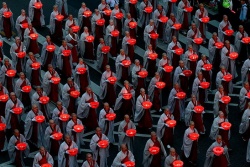Difference between revisions of "Three Views of the Pure Land"
(Created page with "thumb|250px| Just as different ordinary persons can have diverse experiences in the same physical location, different Dharma practitioners will percei...") |
|||
| Line 1: | Line 1: | ||
[[File:Seoul-South.jpg|thumb|250px|]] | [[File:Seoul-South.jpg|thumb|250px|]] | ||
| − | Just as different ordinary persons can have diverse experiences in the same physical location, different Dharma practitioners will perceive the Buddha’s field of activity (buddha-kshetra) in diverse ways. | + | Just as different [[ordinary]] persons can have diverse [[experiences]] in the same [[physical]] location, different [[Dharma]] practitioners will perceive the [[Buddha’s]] field of [[activity]] ([[buddha-kshetra]]) in diverse ways. |
| − | Those who are fully enlightened or near-enlightened —the Buddhas and Great Bodhisattvas on the seventh through tenth levels (bhumis)— perceive the Pure Land as the realm of suchness (dharma-kshetra), the field of non-conceptual, non-dual wisdom. | + | Those who are [[fully enlightened]] or near-enlightened —the [[Buddhas]] and Great [[Bodhisattvas]] on the seventh through tenth levels ([[bhumis]])— perceive the [[Pure Land]] as the [[realm]] of [[suchness]] (dharma-kshetra), the field of [[non-conceptual]], [[non-dual wisdom]]. |
| − | Those who have purified the gross afflictions but still retain the subtle obscurations —the Bodhisattvas on the first through the sixth levels— perceive the Pure Land as the realm of radiant glory (sambhoga-kshetra), the field of uninterrupted joy in the Dharma. | + | Those who have [[purified]] the gross [[afflictions]] but still retain the subtle [[obscurations]] —the [[Bodhisattvas]] on the first through the sixth levels— perceive the [[Pure Land]] as the [[realm]] of radiant glory (sambhoga-kshetra), the field of uninterrupted [[joy]] in [[the Dharma]]. |
| − | Those who earnestly cultivate the mind of enlightenment (bodhichitta) and generate the definitive aspiration for birth in the Pure Land while still burdened with negative karma, perceive the Pure Land as the realm of transformation (nirmana-kshetra), the field of non-retrogression on the path of Dharma. | + | Those who earnestly cultivate the [[mind]] of [[enlightenment]] ([[bodhichitta]]) and generate the definitive [[aspiration]] for [[birth]] in the [[Pure Land]] while still burdened with negative [[karma]], perceive the [[Pure Land]] as the [[realm]] of [[transformation]] (nirmana-kshetra), the field of non-retrogression on the [[path]] of [[Dharma]]. |
{{R}} | {{R}} | ||
[http://greatmiddleway.wordpress.com/2012/10/08/three-views-of-the-pure-land/ greatmiddleway.wordpress.com] | [http://greatmiddleway.wordpress.com/2012/10/08/three-views-of-the-pure-land/ greatmiddleway.wordpress.com] | ||
Revision as of 00:08, 4 September 2013
Just as different ordinary persons can have diverse experiences in the same physical location, different Dharma practitioners will perceive the Buddha’s field of activity (buddha-kshetra) in diverse ways.
Those who are fully enlightened or near-enlightened —the Buddhas and Great Bodhisattvas on the seventh through tenth levels (bhumis)— perceive the Pure Land as the realm of suchness (dharma-kshetra), the field of non-conceptual, non-dual wisdom.
Those who have purified the gross afflictions but still retain the subtle obscurations —the Bodhisattvas on the first through the sixth levels— perceive the Pure Land as the realm of radiant glory (sambhoga-kshetra), the field of uninterrupted joy in the Dharma.
Those who earnestly cultivate the mind of enlightenment (bodhichitta) and generate the definitive aspiration for birth in the Pure Land while still burdened with negative karma, perceive the Pure Land as the realm of transformation (nirmana-kshetra), the field of non-retrogression on the path of Dharma.
